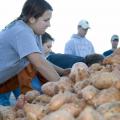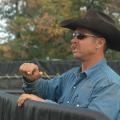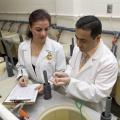Feature Story from 2007
By Robert H. Wells
Delta Research and Extension Center
STONEVILLE -- Waiting until spring to make phosphorus applications can mean a nearly 10 percent increase in rice yields, according to new research by Mississippi State University.
“We receive a lot of questions this time of year about applying phosphorus fertilizer in the fall when fields are dry and prepared for spring planting,” said Tim Walker, rice agronomist at MSU's Delta Research and Extension Center in Stoneville.
MISSISSIPPI STATE -- Mississippi farmwomen living in the Delta can learn how to improve their business management skills during a Mississippi Women in Agriculture – Annie’s Project seminar.
The 9 a.m. to 4 p.m. session will be held Nov. 3 at the Charles W. Capps Entrepreneur Center, located at the Delta Research and Extension Center in Stoneville.
MISSISSIPPI STATE -- Top quality beef animals will move through the auction ring Nov. 15 as Mississippi State University plans to market 84 lots of bulls and heifers from the research cattle herds to the highest bidders.
MISSISSIPPI STATE -- P.C. “Mac” McLaurin Jr. of Starkville will serve on a national association’s committee to address financial issues that face counties.
McLaurin is a professor of local government and leader of the Center for Governmental Training and Technology in the Mississippi State University Extension Service. He has been appointed a member of the Finance and Intergovernmental Affairs Steering Committee of the National Association of Counties.
MISSISSIPPI STATE -- A one-day workshop on Nov. 1 for farmers, landowners and resource managers will provide attendees with the resources to start and manage a natural resource enterprise.
Fee fishing, fee hunting, agritourism, trail riding and wildlife watching are examples of outdoor recreational businesses based on the natural resources commonly found on Mississippi private lands.
This workshop will be held near Benndale in George County. Benndale is located at the intersection of Highway 26 and Highway 57, just west of Lucedale.
MISSISSIPPI STATE -- Tom Knecht, head of the Mississippi State University Office of Agricultural Communications, recently received the highest award given by the Association for Communication Excellence in Agriculture, Natural Resources, and Life and Human Sciences.
MISSISSIPPI STATE -- Mississippi's poultry industry is overcoming challenge after challenge even as U.S. consumers continue to flock to the stores for more.
Kenneth Hood, agricultural economics professor with Mississippi State University's Extension Service, assisted with a recently released report on the economic impact of the state's poultry industry. Naming Hurricane Katrina as one of the biggest challenges in recent years, Hood described poultry as a “resilient industry” to bounce back from some economic obstacles.
By Andrea Cooper
College of Forest Resources
MISSISSIPPI STATE -- Wood products contribute $4.3 million to the Mississippi economy, but weather, insects and other destructive elements destroy one-tenth of the forest products produced each year.
Wood preservatives are used to protect against losses, but there are environmental issues and toxicity problems associated with these products.
MISSISSIPPI STATE -- Mississippi's hot, dry summer reduced pumpkin yields to a ghost of what most growers hoped to see.
David Nagel, horticulture specialist with Mississippi State University's Extension Service, said about half of the state's growers produced an average crop and the other half had no crop at all.
MISSISSIPPI STATE -- Cotton growers across the state should mark their calendars for the Mississippi State University Extension Service’s 24th annual Cotton Short Course to be held Dec. 11-12.
Cotton continues to be a major crop for the state of Mississippi, and the short course will help producers stay current with recommendations for planting and managing next year’s crop.
MISSISSIPPI STATE -- A scientist with a background in home canning, food preservation and processing, and culinary arts is the new food safety specialist for the Mississippi State University Extension Service.
Jason Behrends began working in the Department of Food Science, Nutrition and Health Promotion on June 1. In this position, Behrends is responsible for working with consumers through the food processing industry on food safety issues in both retail and food service establishments.
By Patti Drapala
MSU Ag Communications
MISSISSIPPI STATE -- His auspicious debut at a 1935 football game between Mississippi State and Alabama brought the Bulldogs good luck and a 20-7 victory.
More than 72 years later, the university's canine mascot has become an icon. Because people instantly see Bully as the face of MSU, he must look good, feel great and behave properly to create a favorable impression. He succeeds as a goodwill ambassador because of the College of Veterinary Medicine's comprehensive approach to overseeing his health care and daily routine.
MISSISSIPPI STATE -- Rains that started the third weekend of October put the state's cotton harvest on hold, but they did not substantially damage the crop remaining in the field at the end of the month.
MISSISSIPPI STATE -- Michael T. Kidd has assumed duties as head of Mississippi State University’s Department of Poultry Science.
Kidd, whose experience includes both university and industry research, succeeds Wallace Morgan, who retired in June.
“We are fortunate to have a person with his academic and industry experience,” said Vance Watson, vice president of the Division of Agriculture, Forestry and Veterinary Medicine. “Poultry is an important part of the Mississippi economy, and Dr. Kidd has a proven record of teaching and research in support of the industry.”
MISSISSIPPI STATE -- When rains don't meet the needs of crops in Mississippi's agriculturally rich Delta, producers rely on irrigation to meet their plants' needs, drawing water from the deep and plentiful alluvial aquifer below their soils.
An aquifer is a ground formation of coarse gravel and small rocks filled with water in the cracks and empty spaces. Aquifers are recharged slowly by underground water supplies fed by rainfall often hundreds of miles away.
MISSISSIPPI STATE -- Ronald A. Brown of Starkville recently earned national recognition for his career of service to agriculture and Extension programming.
Brown, the executive director of the Association of Southern Region Extension Directors, recently was inducted into the Hall of Fame for the Cooperative State Research, Education and Extension Service. The CSREES is the U.S. Department of Agriculture’s agency that administers the Extension Service system nationally.
By Patti Drapala
MSU Ag Communications
MISSISSIPPI STATE -- Neither the chill nor the early hour dampened the enthusiasm of 100 Mississippi State University students who gave up their weekend beauty sleep to bag 20,000 pounds of sweet potatoes for the Mississippi Food Network.
MISSISSIPPI STATE -- Mississippi's Christmas tree producers should see a $1.6 million holiday season, but there is room in the market for other growers to join the party.
Steve Dicke, forester with the Mississippi State University Extension Service, said the state is expected to produce 49,500 choose-and-cut Christmas trees this year. This number is slightly down from last year, and significantly down from pre-Hurricane Katrina years.
MISSISSIPPI STATE -- No matter how much they thought they knew, the two- and four-legged students in Peter Ryan's new “special topic” class are learning a lot.
The class, Equine Behavior Modification, is giving 15 students the opportunity to learn how to break horses without breaking themselves. The horses -- as untamed as rarely handled cattle -- are learning that people are more trustworthy than they originally suspected.
MISSISSIPPI STATE -- Mississippi State University researchers are working to develop a new vaccine to protect catfish from a devastating bacterial disease that costs the industry millions of dollars each year.
The U.S. Department of Agriculture has awarded more than $371,400 to MSU's College of Veterinary Medicine to study enteric septicemia, or ESC. Researchers believe a modified live vaccine against the disease could dramatically reduce economic losses to catfish farmers.
Pages
Feature Story Archive
- 2024 (110)
- 2023 (114)
- 2022 (116)
- 2021 (105)
- 2020 (141)
- 2019 (127)
- 2018 (141)
- 2017 (199)
- 2016 (242)
- 2015 (320)
- 2014 (358)
- 2013 (374)
- 2012 (344)
- 2011 (248)
- 2010 (239)
- 2009 (229)
- 2008 (189)
- 2007 (210)
- 2006 (199)
- 2005 (224)
- 2004 (218)
- 2003 (228)
- 2002 (177)
- 2001 (184)
- 2000 (190)
- 1999 (182)
- 1998 (179)
- 1997 (188)
- 1996 (58)
- 1995 (36)











